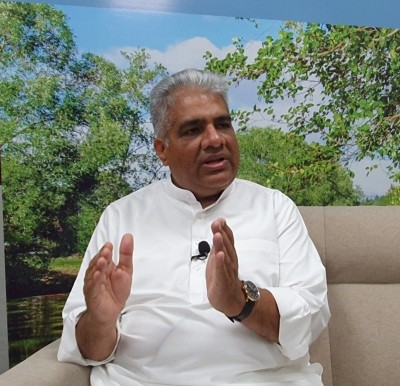
New Delhi, Union Environment Minister Bhupender Yadav on Friday said that cooling has become a developmental need and the government is committed to providing affordable cooling to the poor.
"We need to find sustainable cooling solutions, especially for the workers who are building our roads, highways, and metro networks. They have as much right to sustainable cooling as any of us.
"India was among the first countries to launch a national cooling action plan - called the India Cooling Action Plan - way back in March 2019. The Plan gives a long term vision to address the cooling requirement of India across sectors such residential and commercial building, transportation, cold chain, and industries," Yadav said at the 'National Dialogue on Sustainable Cooling' here.
The event was organised by the Council on Energy, Environment and Water (CEEW), one of Asia's leading not-for-profit policy research institutions.
"By supporting manufacturing and innovation in the cooling sector on one hand and committing to become net zero on the other, India has provided the template for a sustainable agenda for a prosperous and climate-resilient future," he said.
Two CEEW studies - 'Technology Gaps in India's Air-Conditioning Supply Chain' and 'Making Sustainable Cooling in India Affordable' were released at the Dialogue. The CEEW studies highlight that India needs to make available sustainable cooling options for its citizens as it aims to transition to a low-carbon and eventually a net-zero economy by 2070. Promoting local manufacturing of energy-efficient appliances for cooling and refrigeration would also be crucial, it said.
Environment, Forests and Climate Change Secretary Leena Nandan said: "Significant work has already been initiated for the India Cooling Action Plan that was flagged off three years ago. However, much more needs to be done in terms of commitments to phasing down hydro-fluoro-carbons (HFCs). If we align our goals under the Cooling Action Plan with the larger goals that we have as part of our COP26 announcements, then the whole problem will be settled, since we will have an integrated approach."
CEEW CEO Arunabha Ghosh said: "As India continues to experience a severe heat wave condition this summer, shift towards sustainable cooling is a national imperative now. After committing to net zero in 2070, we will now have to work backwards to achieve the target."
"Sustainable cooling could be one of the 'sun rise' sectors that could help us reduce emissions, create jobs, and propel economic growth."
The policymakers will have to nudge the private industry towards the sustainable pathway and thereby link jobs, growth, and sustainability in the cooling sector, he added.
With improved economic growth and consequent rise in household income, India's cooling energy demand is expected to increase eight-fold from the 2018 level to about 1,000 tonnes of refrigeration (TR) by 2038, without interventions, according to data from the Ministry.
This translates to annual greenhouse gas (GHG) emissions of 810 million tonnes of CO2 equivalent, nearly seven per cent of the total annual national emissions estimated for 2037. Under the Kigali Amendment to the Montreal Protocol, India is committed to phase out 85 per cent of HFCs in use by 2047.


.jpeg)

